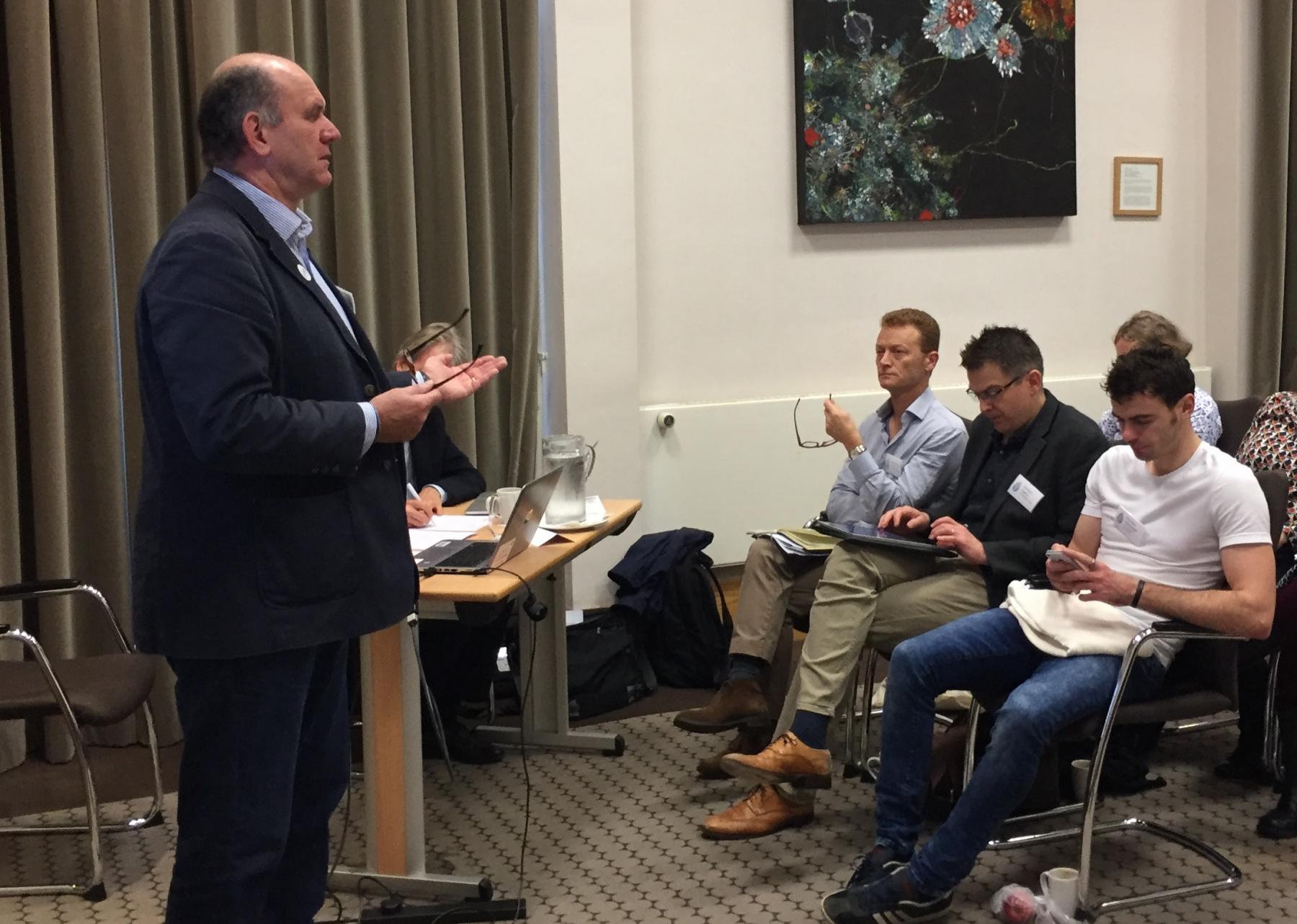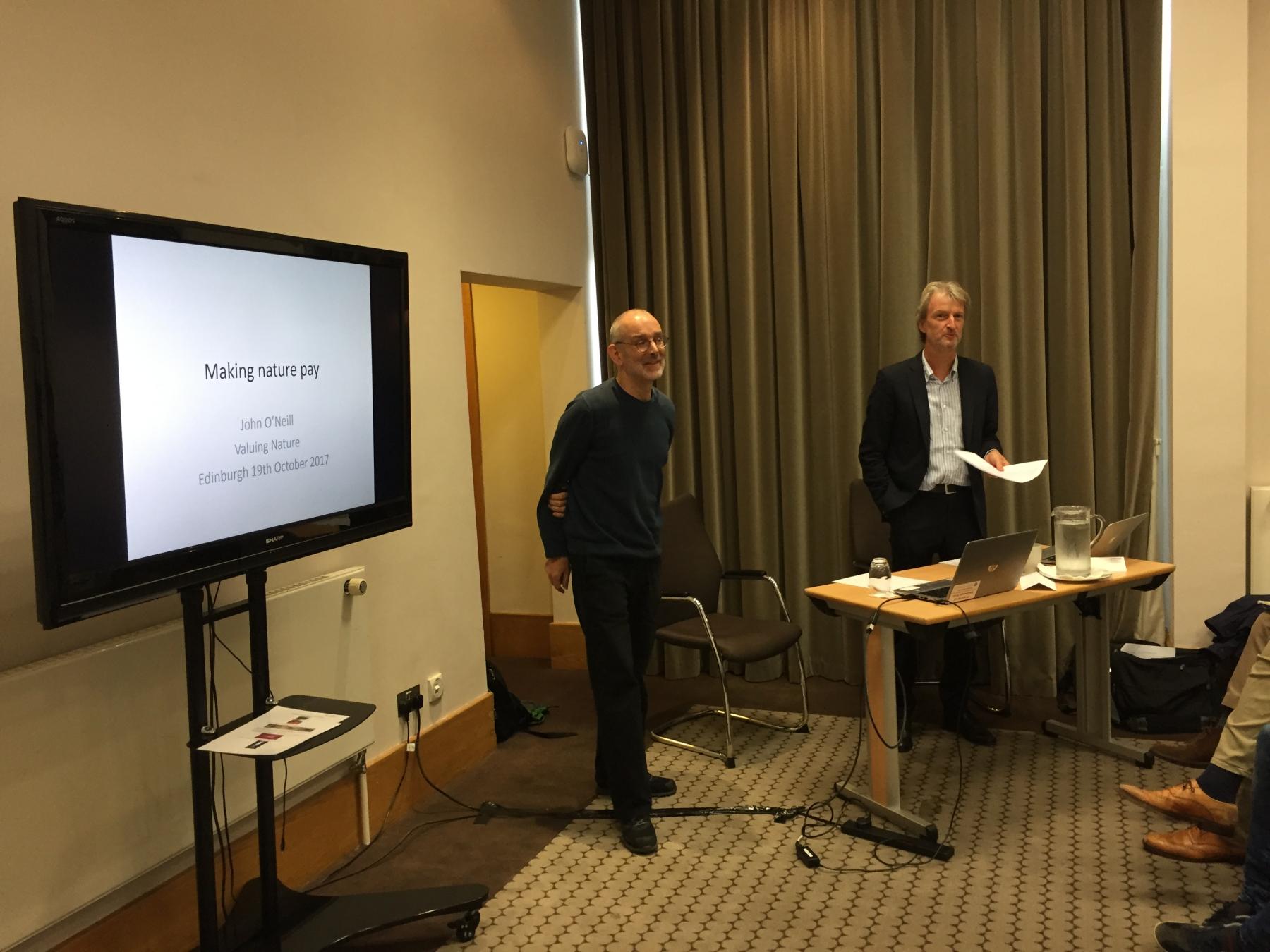Valuing Nature – What am I really thinking?
Guy Duke, Valuing Nature Programme Coordination Team (moderator)
- Mat Roberts, Interserve PLC
- John O’Neill, University of Manchester
- Mike Packer, Ecosystem Assets Ltd
- Alister Scott, University of Northumbria
This session offered some provocative views on valuing nature and business, and stimulated lively debate. Two speakers from business and two from academia addressed questions such as: What does business really think about valuing nature? Is business only interested in the bottom line? Will business only value nature if it pays? Is valuing nature a convenient means for business to perpetuate the exploitation of nature? Are academics jumping on the valuing nature bandwagon falling in to a trap set by liberal economists? What are the problems with valuation of nature? Can valuing nature really help business, and the world, move towards environmental sustainability?
 Mat Roberts noted the continuing decline of nature, despite significant resources invested in conservation. He suggested business is doing little with the new valuation approach, but maintained that business is interested. He called for a greater focus on creating and restoring nature, rather than on valuation, and for business models that make it work, in terms of providing a return on investment.
Mat Roberts noted the continuing decline of nature, despite significant resources invested in conservation. He suggested business is doing little with the new valuation approach, but maintained that business is interested. He called for a greater focus on creating and restoring nature, rather than on valuation, and for business models that make it work, in terms of providing a return on investment.

Mike Packer suggested that we are working with flawed economics and advocated a move to ‘doughnut economics’. He agreed business does not need ultra-accurate valuation of nature. Rather, business needs to find ways to invest in and trade in nature. Valuing nature can help with this. He argued that businesses change when there is a market, and will build new business models and take risks – this is what business does. But business needs appropriate enabling regulation, appropriate constraining regulation and finance to do this. He acknowledged that there are risks and pitfalls in this, for nature, but suggested that these are not insurmountable. There are lots of codes and growing experience on how to avoid the pitfalls and mitigate risk. It is possible both to generate a return for business and a return for nature.
Alister suggested that there is a big gap between, on the one side, science and evidence, and on the other, business practice. He suggested there is a bewildering proliferation of tools, an artefact of research commissioning. He argued for more spaces for these two communities to interact, more co-design and research and impact, farming messages better in the language of business and planners, public funding to de-risk business innovation in relation to protecting and valuing nature, and enabling regulation to create new markets and standards for business to protect and value nature. He argued that innovation in business and planning to protect and value nature required ‘conductors’ to guide the various stakeholders, or better, ‘jazz conductors’ because it requires a lot of improvisation.
Discussion following the speakers touched on a wide range of issues, including the (non-)viability of the prevailing growth imperative, the need to adjust to living within Planetary Boundaries, the need for a new definition of prosperity, the extent to which the state has abdicated the role of protecting nature and whether markets can take on this challenge, the questionable dependence of conservation groups on business funding, post-Brexit opportunities to enhance nature conservation, the need for the 25 year Environment Plan to be a cross-government as opposed to a Defra plan, and the opportunity to exploit a number of relevant ‘hooks’ in the Government’s Green Growth Strategy,
Summary Points
Share
- Valuing nature / natural capital concepts DO work for business
- There is a big gap between science / evidence and business practice
Future
'Prosperity ecology’ – valuing nature to obtain a financial return – comes at a huge risk!
Mat Roberts is Group Director of Environmental Strategy, Interserve PLC. He leads Interserve’s sustainability strategy and lead on the development of the Interserve SustainAbilities Plan with a specific focus on the social and natural capital. He is a Trustee of the Price’s Countryside Fund, a Non Executive Director of Cynnal Cymru Sustain Wales and the National Association of AONBs. John O’Neill is Hallsworth Chair in Political Economy at Manchester University and has just published the paper Life Beyond Capital, which considers the increasing domination of environmental valuation by the language of business-of capital and markets – and problems with the financialisation of nature to ‘make nature pay’. Mike Packer is a Director of Ecosystem Assets, providing consulting services on valuing nature and financing conservation, was Director Impact and Operations, Global Canopy Programme (2013-15), previously worked in trading (sustainable) timber and is a Trustee of Berkshire, Buckinghamshire and Oxfordshire Wildlife Trust.’ Alister Scott is Professor of Geography at Northumbria and a NERC Knowledge Exchange Fellow working on mainstreaming of green infrastructure. He is a self-confessed ‘pracademic’ bringing together research and business to work on environmental challenges.
